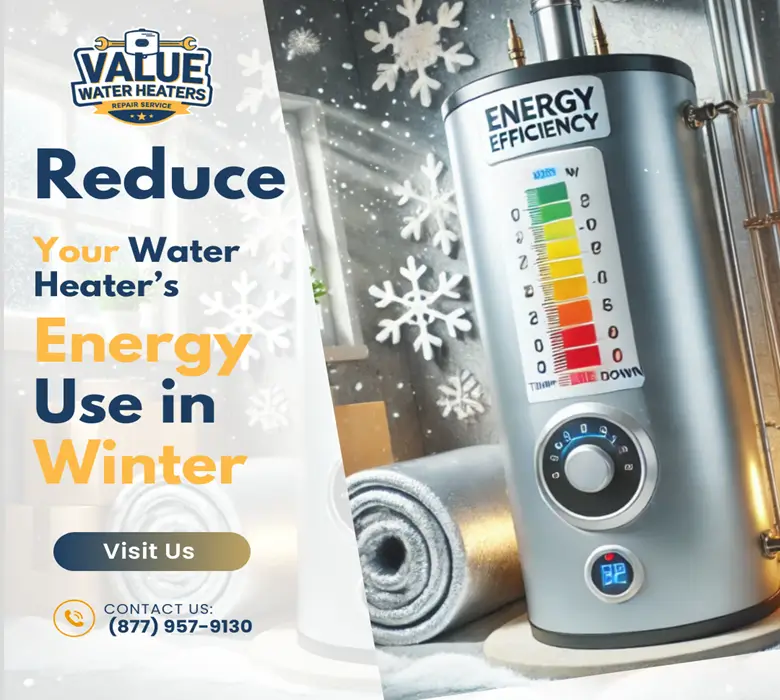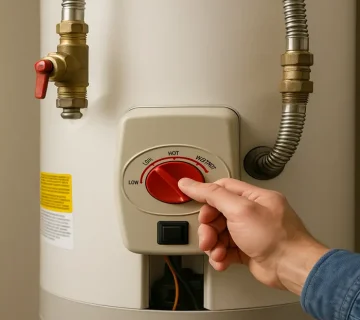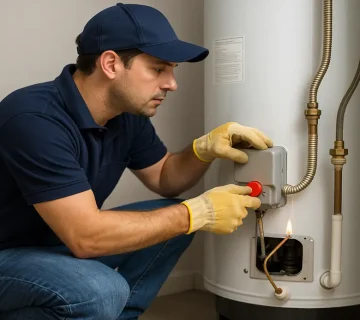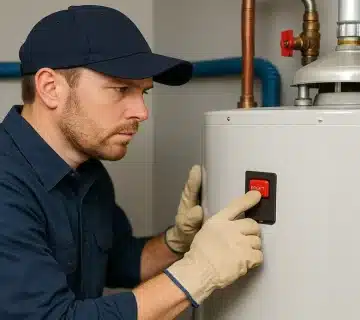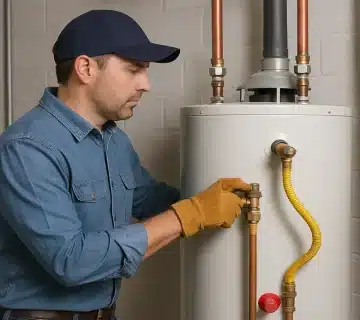Water Heater Energy Use can significantly impact your utility bills, especially during winter. With colder temperatures, water heaters work harder to provide hot water for daily use, making energy efficiency more critical than ever. In this blog, we share six actionable tips to reduce energy use, lower costs, and ensure your water heater operates efficiently all season long.
1. Lower the Water Heater Energy Use by Adjusting Temperature
Reducing your water heater’s thermostat to 120°F can decrease energy use significantly. This small adjustment minimizes heat loss while still providing water hot enough for daily needs like showers and dishwashing. Not only is this temperature safer to prevent scalding, but it also saves an estimated 10% on energy bills annually.
Additionally, consider using a programmable thermostat for your water heater. These devices can automatically lower the temperature during times when hot water is not needed, such as overnight or during work hours, further reducing energy consumption.
2. Insulate the Water Heater to Improve Energy Use
Water heater energy use increases when heat escapes from the tank. Wrap your tank with a water heater insulation blanket to retain heat and improve efficiency. This is especially important for older models without built-in insulation. Insulating exposed hot water pipes leading from the tank can also help retain heat, reducing energy loss during water delivery.
For those in colder climates, insulating your pipes can prevent freezing and ensure a consistent supply of hot water, which minimizes the energy needed to reheat water.
3. Fix Leaks to Reduce Water Heater Energy Use
Even minor leaks can lead to wasted water and energy. Check your water heater and plumbing regularly for signs of leaks and address them quickly to reduce water heater energy use and prevent unnecessary costs. A dripping faucet or a leaking pipe might seem insignificant but can waste gallons of hot water daily, increasing your energy expenses.
Conduct regular inspections by checking under sinks, around the water heater, and in the areas where pipes are visible. If leaks are found, addressing them immediately not only saves energy but also prevents potential water damage and costly repairs.
4. Use Less Hot Water to Minimize Water Heater Energy Use
Conserving hot water is one of the simplest ways to lower energy use. Install low-flow showerheads and fix dripping faucets. Being mindful of your hot water usage can reduce your water heater’s workload. For example, turning off the tap while brushing your teeth or using cold water for laundry can lead to significant savings.
Incorporating energy-efficient habits, like taking shorter showers and running full loads in dishwashers and washing machines, can also minimize water heater energy use. Educating family members on these habits can make a collective impact on reducing energy consumption.
5. Schedule Maintenance to Optimize Water Heater Energy Use
Professional maintenance can ensure your water heater operates efficiently. Flushing the tank to remove sediment buildup and checking the anode rod can improve performance and prolong its lifespan. Sediment buildup at the bottom of the tank reduces efficiency by making the water heater work harder to heat water.
Scheduling maintenance annually can identify potential issues early, like faulty heating elements or corroded parts, saving you from unexpected breakdowns. A well-maintained water heater can last longer and consume less energy throughout its lifespan.
6. Upgrade to an Energy-Efficient Water Heater Model
If your water heater is outdated, consider replacing it with an energy-efficient model. Modern units like tankless or solar water heaters consume less energy, making them an excellent long-term investment. Tankless water heaters heat water on demand, eliminating the need to maintain a tank of hot water and significantly reducing energy use.
Solar water heaters, though requiring a higher upfront investment, use renewable energy from the sun, reducing your dependency on electricity or gas. Over time, these models can drastically cut energy bills and lower your home’s carbon footprint.
Bonus Tips for Reducing Water Heater Energy Use
Use a Timer
Adding a timer to your water heater can help control when the unit operates. For instance, you can set it to turn off during hours when hot water isn’t needed, further reducing energy consumption.
Install Heat Traps
Heat traps can be installed on your water heater to prevent hot water from flowing out of the tank unnecessarily. Many newer models come with built-in heat traps, but they can also be added to older systems.
Leverage Renewable Energy
If possible, integrate renewable energy sources like solar panels to power your water heater. This not only reduces energy use but also helps decrease your environmental impact.
Stay Connected with Value Water Heaters
For more tips and resources, connect with us on social media: Pinterest and X. Follow us for the latest updates on water heater maintenance, energy efficiency, and expert advice.
Conclusion
Reducing water heater energy use doesn’t have to be complicated. By implementing these tips, you can save money, improve energy efficiency, and stay comfortable during the colder months. Whether you’re insulating your tank, upgrading to an energy-efficient model, or simply being mindful of your hot water usage, every small effort contributes to significant savings.
Start with small changes today to see a big difference in your utility bills tomorrow. For more expert advice, visit Value Water Heaters and explore our services. Don’t forget to follow us on Pinterest and X for more updates and helpful tips!

